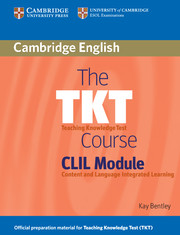Unit 2 - Language across the curriculum
Published online by Cambridge University Press: 27 September 2023
Summary
What is the role of language in CLIL?
CLIL teachers and learners need knowledge of the language of their curricular subject. Learners need to know the content-obligatory language. This is the vocabulary, grammatical structures and functional language for specific subjects. Learners require this language to be able to understand the subject and communicate ideas. For example, in geography learners need to know map vocabulary and how to interpret evidence shown on a map.
Learners also need to know the everyday, less formal language which is used in our subjects. They may already know how to use grammatical structures which they can produce when studying curricular subjects. Learners have usually learned this language in English lessons. For example, in a map-reading lesson learners might use basic verbs such as ‘goes’ and ‘travels’ to describe the route of a river. They may also use a conditional form to describe cause and effect. These are examples of contentcompatible language.
TKT: CLIL tests knowledge of grammatical structures and functional language used across the curriculum but it does not test knowledge of subject-specific vocabulary. However, subject-specific language is used in the test questions. For a list of subject-specific vocabulary, see the list on pages 24–27 of the TKT: CLIL Handbook which can be found at www.cambridgeesol.org/assets/pdf/resources/teacher/clil_ handbook.pdf.
CLIL gives learners opportunities to develop linguistic abilities during lessons, and this includes acquisition of vocabulary and grammar. However, the focus of a CLIL lesson is on understanding subject content, not on grammatical structures. Research in CLIL classrooms shows that most teachers do not teach grammar during content teaching because content and language are integrated. As vocabulary and grammar are interdependent, it is useful to focus on them as chunks rather than separately.
Key concepts
What language knowledge do CLIL teachers and learners need? 1 Vocabulary
Learners have to understand and produce a large amount of subject-specific vocabulary.
Look at the four groups of vocabulary from a maths lesson on the next page. What is the difference between them?
- Type
- Chapter
- Information
- The TKT Course CLIL Module , pp. 11 - 15Publisher: Cambridge University PressPrint publication year: 2010



